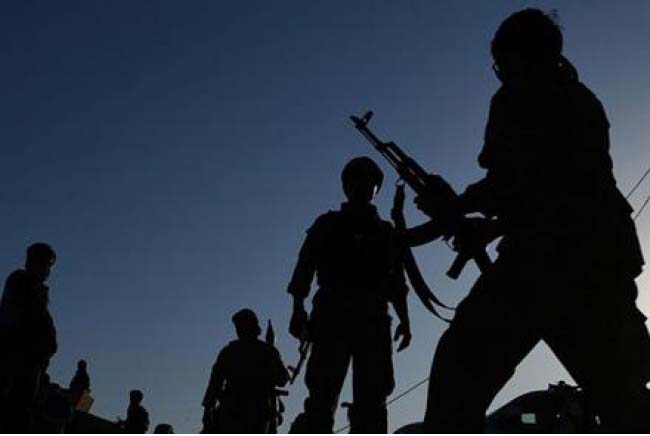Terrorism has been a serious threat to Afghanistan for decades. Afghan nation bears the brunt of militancy with the Taliban’s heavy attacks. In the current year, Afghan civilians and soldiers seem to pay large sacrifices and terrorism continues to take the lives of innocent individuals in public places. Omar’s second successor Mullah Haibatullah, who practices upon radical ideology, is believed to be relentless in pursuit of war and bloodshed. He will not answer positively to the frequent calls for peace.
Of late, the Taliban fighters have intensified their attacks and carry out indiscriminate suicide bombings across the country. The recent attacks in Kabul and Helmand left dozens dead and wounded behind which reveal the Taliban’s negative reply to peace negotiation.
The focus of the NATO-led mission in Afghanistan has narrowed considerably to training Afghan forces and conducting counterterrorism missions since a significant drawdown began under Democratic former US President Barack Obama. Obama was often criticized by Republicans in Congress for focusing too much on driving down U.S. troop numbers in an attempt to force Afghan soldiers to become more self-sufficient.
The US President Donald J Trump and his Afghan counterpart talked on telephone about opportunities to strengthen ties, counterterrorism cooperation and economic development, the White House said in a statement. Trump is said to emphasize the continuing importance of the US-Afghanistan Strategic Partnership and his support for Ghani's government, which is faced with an emboldened Taliban-led insurgency that is still gaining ground after more than 15 years of war.
Moreover, it is said that the US would like to maintain close ties with Pakistan and to use those ties to persuade Islamabad to change its policies towards Afghanistan. Senator McCain, a regular visitor to both Afghanistan and Pakistan, underlined the US dilemma on this issue. Acknowledging that thousands of Pakistanis had sacrificed their lives in the fight against terrorists, he is cited as saying, “But the fact remains that numerous terrorist groups still operate within Pakistan, attack its neighbors and kill US forces.” The senator, who also visited North Waziristan last year, praised Pakistan for conducting a successful military operation in that area, but said that this was not helping the US forces combating terrorists in Afghanistan. “Put simply, our mission in Afghanistan is immeasurably more difficult, if not impossible, while our enemies possess a safe haven in Pakistan. These sanctuaries must be eliminated,” he said.
In the meantime, Russia has announced it will host a regional conference on Afghanistan in Moscow in mid-February, with representatives from Afghanistan, Pakistan, China, Iran and India in attendance. Russian Foreign Minister Sergey Lavrov made the announcement following a Tuesday meeting with his Afghan counterpart, Salahuddin Rabbani, in Moscow. Lavrov highlighted the need for the inclusion of the Taliban in the constructive dialogues in order to find a solution to resolve the security crisis in Afghanistan, prevent the spread of violence and the infiltration of ISIL terrorists in the country.
Within the political wheeling and dealing, peace negotiation has been one of the hotly debated issues at national and international levels, mainly following the failure of “war on terror” launched by Bush administration after the 9/11 terrorist attack. Afghan government established the High Peace Council (HPC) in 2010 to bring the Taliban to the bargain table. Similarly, Afghanistan showed great tendency towards peace long ago and urged Pakistan to nudge the Taliban outfits to sit on the table of negotiation. In addition, Pakistan officials stressed to broker the peace talk and said that “the enemies of Afghanistan are the enemies of Pakistan”. However, no effective step was taken in this regard and militancy continues unabated in the country.
To the Afghans’ unmitigated chagrin, the peace talk holds no sway regarding the security situation in Afghanistan. People lose their lives in every corner of the country in suicide bombings, Improvised Explosive Device (IED) and attacks carried out by the Taliban insurgents. Almost everyone, from the famous figures to the simple citizens, suffers from the terminal illness of terrorism and s/he is exposed to the dangers that would possibly target them in one way or another and if they survive, they would be affected by the trauma of war and violence. If the Taliban seek a bona fide negotiation for peace, they will have to put an end to the indiscriminate killings of the civilians and shrink the battles against the Afghan government. But the militants have escalated their offensive against combatants and non-combatants alike.
No wonder, Islamabad’s role in peace negotiation will be crucial but the Taliban’s escalated militancy widened a gap between Kabul and Islamabad since harsh rhetoric has been changed. The mistrust still needs to be repaired for a genuine struggle for peace. After all, it is believed that the upcoming mid-February conference, which is supposed to be hosted by Russia, will not alleviate the challenges for two main reasons: First, one of the Afghanistan’s greatest allies the United State has not been given role in the talks. Secondly, the Taliban have not given the green light and continue targeting Afghan nation indiscriminately. Hence, there is still no hope for peace and baseless optimism should not be relied upon. The only panacea for bringing peace is to practice upon the policy which suggests “if you want peace, prepare for war”.

